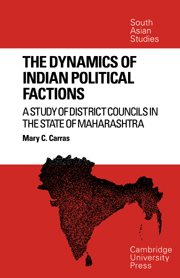Book contents
- Frontmatter
- Contents
- List of tables
- List of maps
- Acknowledgments
- 1 Introduction
- 2 The Argument
- 3 Political Integration: Empirical Conception and Method of Analysis
- 4 Ratnagiri District: Factional Alignments in Conditions of Poverty
- 5 Poona District: The Politics of Sugar
- 6 Aurangabad District: State versus District Leaders
- 7 Akola District: Factional Alignments in Conditions of Relative Plenty (The Politics of Cotton)
- 8 All Districts: Some Comparisons
- 9 Conclusion
- APPENDICES
- Notes
- Bibliography
- Index
- Frontmatter
- Contents
- List of tables
- List of maps
- Acknowledgments
- 1 Introduction
- 2 The Argument
- 3 Political Integration: Empirical Conception and Method of Analysis
- 4 Ratnagiri District: Factional Alignments in Conditions of Poverty
- 5 Poona District: The Politics of Sugar
- 6 Aurangabad District: State versus District Leaders
- 7 Akola District: Factional Alignments in Conditions of Relative Plenty (The Politics of Cotton)
- 8 All Districts: Some Comparisons
- 9 Conclusion
- APPENDICES
- Notes
- Bibliography
- Index
Summary
The term ‘policy orientation’ was introduced at the end of the last chapter, and as it is pertinent to the argument which will be developed in this chapter, I will begin by setting down my understanding of this concept with reference to a factional group or group member. I use the term to refer to some attitude, belief or evaluation regarding an issue in a given political context. I am assuming, moreover, that the nature of this orientation has a determining influence on the behavior of a political actor at any given time and that, in fact, such behavior is one of the manifestations of that orientation.
FIRST STATEMENT OF HYPOTHESIS: CONFLICT OF INDIVIDUAL OR GROUP INTERESTS AS SOURCE OF FACTIONALISM
In the context of this study, I am positing a determinative relationship between the specific factional identity of a group or group member, on the one hand, and its or his hypothetical policy orientation regarding something problematical, on the other. This ‘something’ may be defined in varying terms by a political actor, depending upon, among other things, the level of the political arena.
At the local level – which, in this study, denotes the district – the respondents usually described their political actions as being oriented toward access to material benefits (agricultural loans, seeds, fertilizers, agricultural equipment and so forth).
The political actors under investigation here apparently weighed the potential effectiveness of differing paths of action in ensuring access to such benefits.
- Type
- Chapter
- Information
- The Dynamics of Indian Political FactionsA Study of District Councils in the State of Maharashtra, pp. 13 - 45Publisher: Cambridge University PressPrint publication year: 1972



